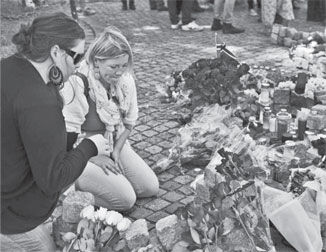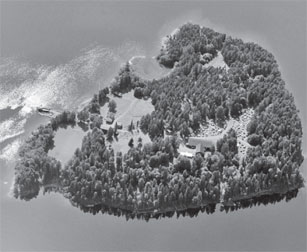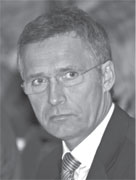 Unfathomable terror in Norway Unfathomable terror in Norway
By Pramod De Silva
Norway lost its innocence on July 22. The events that took place in
and around Oslo, the capital, would forever change one of the most
peaceful countries. The country that awards the Nobel Prize for Peace
lost its peace that Friday afternoon. The bomb that went off in the
centre of Oslo claimed eight lives - and shattered the hopes of
Norwegians - that their tranquil country would be spared of the terror
that had gripped many other countries.
One of the first questions that the media and many others raised was
"why (attack) Norway". The Nordic nation had gained a reputation for
striving to bring peace to other conflicthit countries and it is one of
the most open, tolerant, almost crime-free societies with even a
policeman being a rare sight on the streets.
When the bomb exploded, fingers were pointed immediately at 'Islamic
terrorists'; i.e. al-Qaeda and similar groups. Norway has a small
presence in Afghanistan and there is a belief that all Western European
countries are on the al-Qaeda hit list.
But later events proved the danger of this stereotypical thinking.
Just a couple of hours after the bombing, news trickled in that there
has been a mass shooting in a small island called Utoeya off Oslo where
the ruling Labour Party was conducting a youth camp. Right-wing
extremist Nearly 70 deaths later, the police found the suspect
responsible for this twin carnage: Anders Behring Breivik, a 32-year-old
right-wing extremist who opposed immigration and the 'Islamisation' of
Norway and Europe.
 |
|
People lay flowers in memory of those
who died in the attacks |
 |
|
The island of Utoeya |
He had used several automatic weapons to kill his victims, all
Norwegians. That Norway was attacked by one of its own nationals was a
great shock to Norwegians. The great tragedy is that he killed
Norwegians to express his opposition to Muslims and others migrating to
Norway. Norway's first terror attack has again brought into focus the
undercurrent of discontent over the issue of immigration in European
countries. A number of European extremist parties are openly hostile to
opening the borders to others. Breivik claimed that there are 'cells';
of extremists working to stop the Islamisation of Europe, though police
say he had worked alone, at least in this particular instance.
In fact, he had published a 1,500 manifesto for 'Europe in 2083' some
sections of which have been plagiarised from Unabomber Ted Kaczynski's
rants. The manifesto reveals his obsession with the Knights Templar, a
militant-monastic order. Breivik styled himself as a leading figure in a
resurrected chapter of the Knights Templar. Pre-emptive war Breivik
seemed to be serious about his role and claimed that he, along with
around a dozen others, restarted the order in London 2002 to turn back
the supposed advance of Islam across the West. The manifesto calls for
the 'redemption and defence' of all Christendom.
Breivik writes: "The time for armed resistance has come. The Knights
Templar on behalf of the free peoples of Europe, hereby declare a
pre-emptive war against the cultural Marxist/ multiculturalist regimes
of Western Europe."
Perhaps more than any other nation on Earth, Norway practised
multiculturalism in the true sense of the word. In a way, there's hardly
any difference between Breivik and others of his ilk and groups such as
al-Qaeda, for both groups abhor assimilation and diversity. Terrorists
of whatever hue attack these very values that we cherish: democracy,
openness, freedom, justice, unity and diversity.
Herein lies the danger faced by all civilised nations: it is
difficult to stereotype terrorism and terrorists. From 9/11 to Norway's
7/22, innocent lives were lost in the end, all for a hazy 'cause' that
served no purpose. The same applied to the brand of terrorism
perpetrated here by the LTTE. In today's world, acts of terrorism can be
totally unconventional. The terror in Norway came from a completely
unexpected quarter and took the entire world by surprise.
This is why it is important to be vigilant 24/7. As the saying goes,
terrorists have to be lucky only once and governments have to be lucky
all the time. There are indications that Norway could have been better
forewarned and prepared if the authorities pursued certain leads
earlier. For example, Breivik has been flagged for purchasing chemicals
from Polish supplier Lukasz Mikus earlier in the year. But intelligence
agencies did not warrant it suspicious enough to investigate further.
 |
 |
| Anders Behring Breivik |
Norwegian Prime Minister Jens
Stoltenberg |
Pan-European probe Even such a tiny gap is enough for a terrorist to
wriggle through and cause mayhem. There should be no room for terrorism
anywhere in the world. Intelligence, both in the form of men on the
ground and technological methods, should be increased and shared among
nations. The Breivik probe has already become a pan-European one -
international cooperation is vital to stop terrorists in their tracks.
All countries, not just those in a so-called 'hit-list' must be
prepared for terror attacks. The Norway killings revealed great gaps in
the country's domestic security. Norwegian police had come under flak
for their apparently slow response to the emerging disaster. According
to reports, emergency calls from the island were put on hold because the
operators were giving priority to calls from the bombed buildings.
Norway's quick-reaction Delta Force doesn't own a helicopter. The
police, for the entire country, own only one helicopter based north of
Oslo and it could not be used because the pilots were on holiday.
In a macabre twist, it has been revealed that a Norwegian television
helicopter was circling the island as the shooting was in progress and
actually captured the killer on tape while the police were trying to
scramble a helicopter. Police have already acknowledged they did not
arrive on the island until an hour after being told about the shooting.
The controversy over the response time deepened when it was disclosed
that officers racing to the island had to use two civilian boats after
their own vessel suffered engine problems. A rescue operation that
should have taken 15 minutes instead took nearly 90. Loss of innocence
But now Norway and many other countries which had not faced terror
incidents will essentially have to change. One expert said that
'Norwegians may see the security precautions they must now take as some
kind of loss of innocence, but they have to be done'. The Norwegian
incident also highlights a recent trend in terrorism, the use of
automatic weapons on civilian persons and targets.
 |
|
Helping the injured at
Utoeya |
This was the main method used by the terrorists who attacked Mumbai
in November 2008 and the Sri Lankan cricket team in Lahore in March
2009. There seems to be easy access to light automatic weapons, be it
for a lone terrorist or a terrorist group. An even more dangerous
possibility is the use of chemical or biological weapons by terror
groups.
It has already happened at least once - the Japanese religious cult
Aum Shinrikyo poisoned the Tokyo subway system with Sarin, a deadly
nerve gas, in 1995, causing 13 deaths and 6,252 injuries. No room should
be left for such an attack again. The world must get together to fight
terrorism. Sri Lanka has successfully eradicated terrorism from its soil
after 30 long years.
As the LTTE and al-Qaeda have demonstrated, terror networks are
interconnected and truly global in nature. Thus it has become a
worldwide scourge that should be dealt with firmly.
Nations must exercise eternal vigilance and be prepared at all times.
In this context, a recent report compiled by the Centre for New American
offers a valuable insight: "In dealing with extremist groups and cults,
the world is playing Russian roulette - many chambers in the gun prove
to be harmless, but some chambers are loaded". It is these bullets that
the world must try to stop, and in the event they are fired, faced with
courage and a conviction to stop the next one. |

